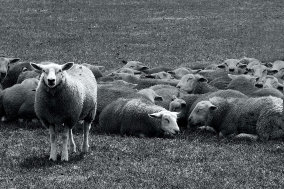Book summary of
The Start-Up of You

This is a book about applying entrepreneurship principles to grow your career: competition, relationships, planning, risk management... everything to embrace change and seize market opportunities.
Chapter 1 - Why all humans are entrepreneurs
What's an entrepreneurial mindset? An entrepreneur is used to high levels of entropy. A capacity to adapt in a fast-changing environment is what makes a great entrepreneur.
Why do we need an entrepreneurial mindset? Because of globalization and digitization, job security is not what it used to be. Hard work and good will are not enough anymore to climb the corporate ladder, get a job, or keep a position. We can't rely on employers to ensure our success: we have to invest in ourselves, we have to think of our career as a company.
Why is everyone born an entrepreneur? Not everyone is meant to launch a business, but we are all born with an entrepreneurial mindset. Cavemen were self-employed, we evolved by creating and taking considerate risks. Creation is the corner stone of entrepreneurship, and everyone has the power to create. Develop an entrepreneurial mindset to keep evolving.
Why is it urgent to start thinking like an entrepreneur? Success can never be taken for granted, you have to constantly innovate and grow to get ahead of any change.
What's the Permanent Beta mindset? It's about improving every day. No work is ever finished, there is always room for improvement. We all can change for the better and improve the world around us at the same time.
What are the key skills to develop? 6 key skills: Developing a competitive advantage, thinking in terms of ABZ planning, creating a professional network, identifying and making opportunities, managing risk, and learning to leverage network intelligence.
What are the goals? 1) Surviving periods of change and 2) Thriving in the new global economy
Chapter 2 - How to develop a competitive advantage
Why do we need to develop competitive advantages? Most things worth pursuing in life involve massive competition, we have to differentiate ourselves by finding what's rare and valuable about us. It's a continuous process.
How do we identify our competitive advantage? It's the intersection of our assets, our aspirations and values, and the market realities.
What's an asset? It's something you already possess. There are soft assets (skills, reputation, personal brand, connections) and hard assets (capital: cash, stocks, material possessions).
Why are assets important? Pursuing soft assets allows us to stay economically relevant, but hard assets make it easier to survive during hard financial periods.
What are aspirations and values? Aspirations are what we aim at, values represent what we cherish in life.
Why do we need aspirations and values? They allow us to work harder and better. In a competitive environment, endurance is key.
How do we find our aspirations and values? By doing. Nothing will come to you right away, you need a proactive mindset first.
What are the market realities? No asset or aspiration will allow us to thrive if they don't take into account people's needs: what will customers buy your time for? Focus on their needs, talk to them to find out the things they need. Those things are the market realities.
How do the three fit together? We have to adapt our skill set and our capital to the market realities while remaining aware of our aspirations and values. Each part is constantly moving and need frequent re-evaluation.
How do we use our assets? We can either grow our assets or niche down (finding a smaller market with less competition).
Chapter 3 - How to plan to adapt
Why is "find and follow your passion" flawed advice? Following fixed goals prevents us from adapting to the ever-changing environment we live in. Our interests frequently change as well. We have to do things we love but also stay flexible. Make time for planning, but never have firm plans. Success is a series of disciplined choices, it's not random, but it's not the result of an absolute plan either.
What is ABZ planning? It's a methodology to make disciplined choices minimizing risks while remaining flexible, using trial and error.
What is Plan A? It's what we are doing now.
What is Plan B? It's what we can pivot to when we need to change, either because Plan A doesn't work or is threatened, or because a better opportunity showed up. A pivot is always something different, but related.
What is Plan Z? It's what we can fall back on if everything fails.
How do we make plans? Plans have to leverage our current competitive advantage, but there are some good rules of thumb we can follow to find the right plans: 1) prioritize learning to maximize revenue and sense of fulfillment over the long term, 2) learn by experimenting but minimize the cost of failures by taking small reversible steps, 3) think ahead, and 4) develop a personal brand independent from employers.
Chapter 4 - Why we need a network
Why do we need a network? We can't do anything alone. We need allies and advisors to grow our careers. People are social animals: sometimes, strong relationships are more important than skills.
What is I^We? It's the idea that there is no dichotomy to make between I and We, we need both. A career depends on our individuality and on our network to magnify it. We can't only rely on the team to get work done, and we can't do everything by ourselves either.
How do we build genuine professional relationships? Always think long-term. It's not a business transaction, be empathetic (don't just listen to reply, understand what the other person needs) and give first. Pay it forward while remaining authentic, without being calculative or thinking about what's in it for you. Most importantly, have fun doing it or don't: networking should never be a chore.
How do we expand our network? Get introduced by the members of your already established network. A network easily compounds if you're introduced to friends of friends: if an average person has 20 friends, a network of 20 close friends gives you a virtual access to 20^3 (8000) individuals.
What makes a great network? Diversity and closeness: diversity extends our possibilities, and closeness makes a relationship more fruitful. Having a bigger network is relevant, quality matters.
How to maintain relationships? Give without expecting. Let yourself be helped. Connect people together. If you've fallen out of touch, make the first move to reconnect (and don't do it just because you need something, be genuine).
Chapter 5 - How to pursue breakout opportunities
What's a breakout? It's a project, connection, or experience leading to rapid career growth. Breakout opportunities result from luck, but also from our ability to see them.
Why do we need curiosity? Curiosity is needed to find and pursue opportunities. It helps us cultivate serendipity, good fortune.
Where do we find opportunities? It's always people holding opportunities, so meet new people, whether it's online, in networking events, or in more informal places.
How to pursue breakout opportunities? Build your opportunity-generating network, be resourceful to reach your goals (hustle), be resilient (don't be afraid of constraints, play the long game).
What makes a great opportunity-generating network? High-quality people in the same geographic location, sharing common interests and willing to share and cooperate. If you can't find one to join, make your own.
Chapter 6 - How to take intelligent risks
Why should we take risks? Risks are part of life, we can't avoid them. Regularly taking on intelligent risks makes us more resilient on the long run, because it conditions us to think better and faster, even during the most chaotic times.
What's an intelligent risk? Take risks you can recover from: reversible risks with a tolerable worst-case scenario. Also, uncertainty is not risk. It's not because a plan is not perfectly laid out that an opportunity is a risk, weigh the possible outcomes instead. When most people qualify something as risky, don't follow the herd and make your own opinion.
Chapter 7 - Who you know is what you know
What's intelligence? "Actionable, timely information on all facts of a business." It's mandatory to have your own system to gather this intelligence in order to better navigate the world's troubled waters.
How do we gather intelligence? By talking to people in your network. This "network intelligence" will guide you better and faster than a long hazardous research process. Start with people, then formulate your opinion with further personal research.
What's network literacy? "It's knowing how to conceptualize, access, and benefit from the information flowing through your social network."
What are the best ways to access this intelligence? Pose broad questions to your entire network to invite conversation. Target direct questions to domain experts, smart individuals, and/or close people. Ask good questions by being conversational, adjusting to your audience, and following up with even better questions. Forward your findings to your network and engage it. Once you acquired enough information, synthesize it to make it actionable.


























